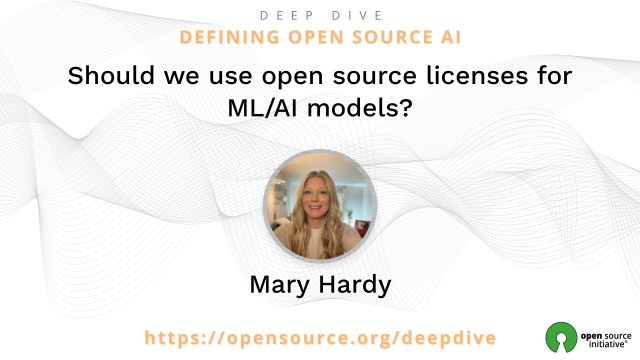Part of the Deep Dive: AI Webinar Series

Open source AI models are exponentially increasing in number and the variety of open source licenses chosen is substantial. Can all OSI-approved licenses be used uniformly to fit the various components of AI?
During the session, open source attorney Mary Hardy will explore questions present and future about open ML model licenses, including:
Why is AFL-3.0 so popular?
What about Apache-2.0? GPL-2.0/3.0?
What are the implications of licensing modifications under a different OS license than the checkpoint used as a basis?
Is a new license that explicitly considers ML model weights needed?
Webinar summary
In this webinar hosted by the Open Source Initiative as a part of the “Deep Dive: Defining Open Source AI” series, Mary Hardy, corporate counsel at Microsoft, discusses the challenges and complexities surrounding the application of open source licenses to machine learning models and components. She highlights the ambiguities and contradictions in existing licenses like GPL 3.0, GPL 2.0, and the Academic Free License 3.0 (AFL) when it comes to defining what constitutes the “preferred form for modification” and how these licenses may not align with the evolving nature of machine learning models and datasets. Hardy also mentions instances where licenses are specifically tailored to include machine learning components, but these adaptations can lead to compatibility issues and restrictions on the use of trained models and weights. Hardy questions whether creating new, highly specific licenses is a solution or if it would exacerbate the problem of license proliferation and incompatibility in the open source AI community.
Slides
[publishpress_authors_box]
